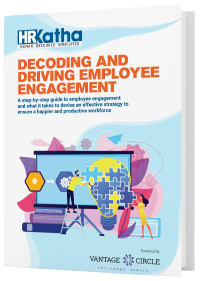Employee Engagement Ideas To Take Away From Snapdeal 2.0

Consider this as a bedtime story for all current and future entrepreneurs. Employee engagement is necessary for your business. Indeed, Snapdeal-who everyone wrote off-came back stronger than ever. Their secret? Brilliant employee engagement ideas and strategies, according to co-founder Kunal Bahl.
Snapdeal is back into the scene after being invisible for more than a year. Snapdeal 2.0, as reinvented, reported cash-positive for the first time in its history.
In particular, the reason Snapdeal 2.0 has seen the light of the day is that of Snapdeal's employees. Moreover, Snapdeal founders-Kunal Bahl and Rohit Bansal- acknowledged that employee engagement ideas played a massive role in the revival of their company.
Take note. Learn from it. Employee engagement ideas can change your company's fortune.
To illustrate, think of employee engagement ideas as the Robin to your Batman. Employee engagement has your back. Employee engagement will save your company in times of peril.
Thus in every situation, your employees are your biggest assets.
Motivated and happy employees will be able to handle whatever bad days your company will possibly face.
But the good news is that most employee engagement ideas are already tried and tested throughout the years. In fact, your first job is to mine this gem of an opportunity.
Let's take a look at how Snapdeal did it.
Snapdeal 2.0 and Employee Engagement Ideas
Recently, Bahl wrote an article on LinkedIn where he addressed the rumors circulating about the future of Snapdeal.
Bahl’s article is a “how-to” masterpiece on incorporating employee engagement ideas.
According to Bahl, by the time the merger discussions with Flipkart fell through, Snapdeal was facing its worst-ever crisis.
Bahl and Bansal decided that instead of running away, they would face the problem heads on. As a result, on July 31, 2017, Snapdeal 2.0 was born.
Yet, they realized they were working on borrowed time. For one thing, Snapdeal 2.0 was facing the mighty task of solving its predecessor's problems.
- By the time Snapdeal 2.0 started, it only had a few months' worths of money left.
- A painful resizing of about 80% of the workforce in February 2017.
- By July of 2017, many of the employees stopped coming to work. The employees were not sure whether they would have a job by the end of the month. Thus, they cared little enough.
- Without employees' cooperation, Snapdeal 2.0 was bound to fail.
Thus, Snapdeal 2.0 needed to change tactics if it hoped to survive this crisis.
Well-stocked pantries and after-office parties created temporary highs. Such basic engagement strategies were clearly not going to work.
Consequently, Bahl and Bansal decided to revamp their strategies. They agreed that employee engagement ideas were their foremost priority.
As a result, Snapdeal 2.0 saw a flurry of activities in terms of employee engagement. The months of August, September, and October 2017 were all about engaging employees. It led to an abundance of employee engagement ideas.
For Snapdeal 2.0 to succeed, every employee needed to invest physically as well as emotionally.
It seemed like it was Snapdeal 2.0 versus the world.
Employee Engagement Ideas: How Snapdeal Dealt With It
1. Conducting various meetings
The few remaining employees at Snapdeal were essential. Each one of them was crucial in ensuring Snapdeal 2.0's success.
The major problem was that every employee had a fear of getting laid off. Bahl and Bansal were sure that it wasn't necessary. Every employee was to be a part of their new venture.
The employees themselves were not too sure about it. So how to go on about changing their perception?
To combat these doubts and fears, Snapdeal organized a series of meetings.
- At first, they conducted company-wide town-hall meetings. There, Bahl and Bansal communicated with the whole company together in the same room. They gave assurances and explained their commitments.
- Then, team-wise meetings followed. Briefing of team members about their role in building future Snapdeal 2.0 occurred. The need for a team working together was more significant than ever. Each team had a goal to fulfill.
- At last, a 1:1 meeting with every employee took place. Each employee spoke with at least one or more members of the leadership team. The employees were clarified of their personal worries and doubts.
2. Keeping up the employees’ motivation
To keep up employees' motivation throughout the whole process, distinct measures were followed.
- Distribution of personalized copies of motivational books. These books had motivational, handwritten messages from Bahl and Bansal.
- Monthly newsletters about the progress made so far.
- Progress updates went out regularly. This motivated the employees that they were nearer to their goal with each passing day.
- Bahl and Bansal gave regular presentations to the employees about several topics. They ranged from strategy and executing plans to the various uncertainties faced.
According to Bahl:
The enthusiasm of each member of the team is the building block of our business, and the waning despair being replaced by growing positivity was becoming quite visible.
3. Results took center stage
The most important task was to show that their hard work was not going in vain.
As the months progressed, the results spoke for themselves. Due to the new and improved management, Snapdeal was finally gaining some ground.
The celebration of fulfilled objectives was mandatory for increasing employee morale. Also, it was important for the employees to focus on the goals and plans.
- Installed screens all over the office.
- These screens displayed live dashboards where they tracked the real-time progress as compared to their targets.
- With increasingly positive results, the employees' morale lifted up. They knew they were on the right path. The outside criticism started to matter less.
4. Building Focus
After selling FreeCharge to Axis Bank for Rs 385 crore, some of Snapdeal's trouble dissipated.
Thus, from October of 2017, money troubles were a thing of the past. Therefore, Snapdeal was free to pursue its profit objectives without worrying about securing funds from external sources.
The only focus was now on prepping Snapdeal 2.0 to launch as soon as possible.
- From October '17, the monthly margin of earnings was set.
- As the margin pools gradually filled up each month, the entire team was there to experience it. This boosted their enthusiasm and belief.
- Therefore, having a well-researched and consistent goal was the key. Having a far-fetched plan would have only contributed to the misery.
Therefore, the year 2017 ended on a positive note. As a result, the last three months saw the completion of individual monthly targets. What can be a better motivator than this?
5. Rewards and Recognition
Bahl stated that:
Each opportunity to appreciate the incredible work of the teams became an impromptu celebration.
Rewards and recognition is the best employee engagement idea. The knowledge that the meeting of goals will result in reward pushed the employees to do better.
Snapdeal set up various forums for rewards and recognition for the employees.
Rewards were given to the employees who were performing well, were meeting their goals, and were great team members.
One of the unique employee engagement ideas was the introduction of the "Machate Raho" Awards.
- Notably, these awards showcased the winners and displayed their achievements on the screens.
- Bestowing the "bands of glory" to the winners, which made them stand out from others.
- As a result, motivation among the employees was at an all-time high.
6. “Chai Pe Charcha”
Bahl and Bansal conducted "Chai Pe Charcha" ( literally translates to "discussions over tea") with the top performers. This group of people met every month, drank tea, and chatted with each other.
It was such an informal event by itself. And a very, very Indian thing to do.
Something that Snapdeal was trying hard to establish was that an Indian e-commerce site can dominate the market. And everybody knows that there's nothing more Indian than the love for chai.
The top performers gathered around each month and chatted. There, they talked about diverse topics. Mainly about their personal lives, issues at work, short-term worries, and long-term hopes.
These sessions made something extraordinary happen. The high achievers of different departments had a chance to interact.
Otherwise, a data scientist made a change in the algorithm to reduce returns of the previous months, and a call center agent, who gave excellent customer service, would rarely cross paths.
7. Boss’s Day Out
The senior team clearly needed a day for themselves among all the chaos.
At the end of the day, even the senior team were employees themselves. Although they had been acting as support for other employees, they also experienced their fair amount of stress.
Thereupon, Bahl and Bansal started regularly taking the senior team out to dinner once a month.
- These dinners were rather laid-back affairs.
- There, work was not discussed. Instead of discussing targets and achievements, they talked about everything else under the sun.
- Bansal and Bahl got to know more about the persons who were running the show for them. Accordingly, the senior team members got a sense of belonging and appreciation.
As a result, these dinners acted as a catalyst to bond them together. They were all fighting the same war. More than colleagues, they needed to be friends first.
8. Building trust
Sugarcoating things was not going to benefit anyone. Every one of their employees needed to be aware of what was happening.
Thus, Bahl and Bansal decided that transparency was their best option. Bad or good, everything was laid out bare.
Snapdeal followed an interesting concept of "reverse interviews." A reverse interview is just as it sounds. The general interviewers had become the interviewees.
Bahl and Bansal were on the receiving end of questions from employees. It was Snapdeal's turn to convince the employees on why the employees should invest in it.
- Pitched their aspirations and goals to the employees.
- Significantly, answered all the questions put forth by the employees.
- In interviews with the CFO employees, the monthly financials were opened up. They laid bare the hard facts: Snapdeal would be a fast-growing, sustainable business that will focus on margins and growth value.
The Comeback
In July of 2018, Snapdeal reported cash positive for the first time in its history.
It was a victory against unimaginable odds: accelerated timeline, no cash reserve, dwindling motivation.
The only thing in their hands were the plan, their objectives, and a team that worked day and night to make it a success.
But to actually achieve their goal was better than their imaginations. It was all worth it.
Being cash positive meant that Snapdeal was finally financially independent. Indeed, now they could concentrate on the company's growth and shift the focus to new directions. Accelerating growth would not interfere with cash generation.
Thus, by the end of July 2018, Snapdeal:
- Doubled their monthly orders and revenues.
- Furthermore, cut down cash burn by more than 100%.
- As expected, 20 million Indian customers will buy from Snapdeal in the coming year.
- Also, moved their office to a new, open plan. Thus, no cabins for anyone. It established a more unified and equal culture.
For Snapdeal, one year changed everything. The main contributors to their success were a mere 800+ employees. It took grit, focus, discipline, and a whole lot of employee engagement ideas.
Snapdeal took employee engagement ideas so seriously that when it reported cash-positive, the family members of all their employees received personalized thank-you letters.
In those letters, Snapdeal appreciated the commitment put out by the employee's families.
There, it stated that the milestone achieved was also because of their belief and patience. Snapdeal truly believed that it takes a family to achieve the success that they had.
And that's what every employee was to them- a member of the Snapdeal family.

Vantage Circle is a simple AI-powered Rewards & Recognition Platform for upgrading your employee experience and engagement for better productivity.






